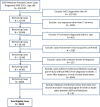Racial differences in patterns of treatment among men diagnosed with de novo advanced prostate cancer: A SEER-Medicare investigation
- PMID: 31094098
- PMCID: PMC6558501
- DOI: 10.1002/cam4.2092
Racial differences in patterns of treatment among men diagnosed with de novo advanced prostate cancer: A SEER-Medicare investigation
Abstract
Purpose: Approximately 5% of men were initially diagnosed with (also referred to as de novo) advanced stage prostate cancer and experience far poorer survival compared to men diagnosed with local or regionally advanced disease. Given the number of new therapies targeting metastatic and castrate-resistant disease, we sought to describe recent treatment patterns by race for de novo AJCC stage IV prostate cancer.
Methods: We used Surveillance, Epidemiology, and End Results (SEER) data linked to Medicare files to identify men aged 66 and older diagnosed in 2004-2014 with advanced prostate cancer, and examined patterns of treatment among all patients and stratified by race/ethnicity.
Results: There were 8828 eligible patients identified, and non-Hispanic black (NHB) patients were more likely to go without treatment (P < 0.001) compared to non-Hispanic white (NHW) patients, even after accounting for early mortality and TNM stage. The frequency of nearly all forms of treatment was lower among NHB with the exception of orchiectomy, which was significantly higher (10.1% vs 6.1%, P < 0.001), and the use of the progesterone Megace among Medicare Part D enrollees (24.6% vs 15.0%, P < 0.001).
Conclusions: Results from this study of elderly Medicare patients presenting with advanced stage prostate cancer suggest that NHB men are less likely to pursue aggressive treatment options. With the reduction in screening for prostate cancer, presumably tied to USPSTF recommendations, and the increasing incidence of men diagnosed with de novo metastatic disease, understanding drivers of treatment-related decisions are critical in reducing racial disparities in advanced prostate cancer outcomes.
Keywords: AJCC Stage IV; African American; prostate cancer; treatment disparities.
© 2019 The Authors. Cancer Medicine published by John Wiley & Sons Ltd.
Conflict of interest statement
The authors declare no conflict of interest.
Figures
References
-
- Siegel RL, Miller KD, Jemal A. Cancer statistics, 2018. CA Cancer J Clin. 2018;68:7‐30. - PubMed
-
- Dalela D, Sun M, Diaz M, et al. Contemporary trends in the incidence of metastatic prostate cancer among US men: results from nationwide analyses. Eur Urol Focus. 2017;5:77‐80. - PubMed
-
- Hoffman RM, Meisner AL, Arap W, et al. Trends in United States prostate cancer incidence rates by age and stage, 1995–2012. Cancer Epidemiol Biomarkers Prev. 2016;25:259‐263. - PubMed
-
- DeSantis CE, Siegel RL, Sauer AG, et al. Cancer statistics for African Americans, 2016: progress and opportunities in reducing racial disparities. CA Cancer J Clin. 2016;66:290‐308. - PubMed
Publication types
MeSH terms
Grants and funding
LinkOut - more resources
Full Text Sources
Medical


